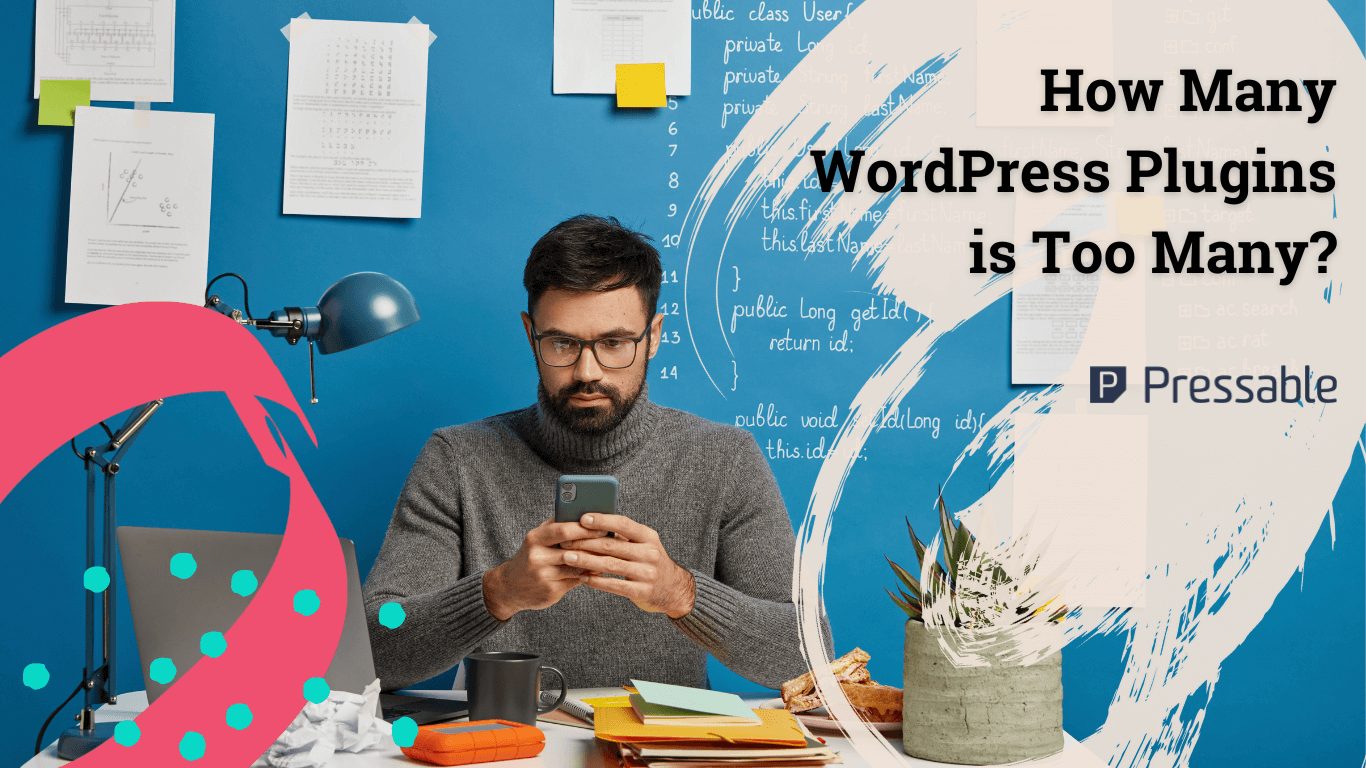WordPress plugins are like candy. Having a few pieces is fine, but too many can cause problems. So how many WordPress plugins is too many? The truth is there’s not a magic number – what works for one site might be too much for another. To help you decide how many WordPress plugins is too many for your site, we put together this post with our tips on when and how to use plugins.
Why Use a Plugin?
Plugins provide the flexibility to customize your site in countless ways and they’re part of what makes WordPress such a great platform.
Common reasons to use a WordPress plugin include:
- Adding Functionality. Add functionality or features to WordPress. For example, people install WooCommerce to add ecommerce functionality to WordPress.
- Changing Design. Plugins enable you to make design changes without custom coding your pages or theme files.
- Enhancing Security. Plugins can also help protect your site from security vulnerabilities and provide a way to backup your site.
- Optimizing Performance. Consider performance and image optimization plugins if you want to increase your site’s loading speed.
- Improving SEO. Several plugins offer features to improve your site’s search engine optimization. Use these plugins to add the right schema and metadata to your site.
How Many WordPress Plugins is Too Many
If you launch a plugin installing frenzy, your site performance will likely suffer.
So how many WordPress plugins is too many? The short answer is: not one more than is necessary. Most sites won’t need more than five or so plugins, but others need more.
If we had to give a number on the high end, we suggest not exceeding 20 plugins. Of course, this depends on what your site needs and each site is unique – some may need even more. When your site performance begins to suffer, it’s time to start uninstalling plugins.
How Plugins Impact Site Performance
Plugins can cause errors and slow down your site. If you install too many plugins, you’re more likely to run into conflicts. Two plugins could be incompatible or try to do the same thing. Each plugin you install also adds code to your website. Plugins could be calling scripts and CSS files on every page of your site for features and options you’re not using.
Alternatives to Using WordPress Plugins
If you’re worried about using too many plugins, you might consider what other options will work for your site. You can often rely on your managed WordPress hosting service or consider custom coding a solution.
Hosting Features to Replace Plugins
If you pick a WordPress-specific host like Pressable, you can eliminate the need to install plugins to handle basic tasks for your site. At Pressable, our plans include state-of-the-art security monitoring, automatic backups, and advanced caching and CDN options.
With other hosts, you’ll have to install multiple plugins to get the same services that Pressable provides. Paying for all those plugins could be expensive, and they’ll likely slow down your website. It’s just one reason that cheap hosting could end up costing you more.
Custom Code Instead of a Plugin
If you’re installing a plugin to tweak one thing, you might want to consider if you’re better off custom coding a solution.
When you install a plugin, you can add code to every website page to tweak something on one page. Some plugins may be overkill. Before you install a plugin, see if you can accomplish the same thing with your theme’s existing options or by using a custom-coded solution. Could you accomplish the same thing by adding a bit of custom CSS to the page?
Tips for Using WordPress Plugins
When you need a plugin, there are some things you can do to ensure you don’t run into problems. Follow the best practices to ensure your plugins and site work smoothly.
Only Install What is Needed
Just because you can doesn’t mean you should. You can install as many plugins as you want, but you’ll run into issues if you have too many. Consider using alternatives when you can and only install plugins that are absolutely necessary.
Ensure Quality Coding
Before you install a plugin, check its quality. Start by only downloading and installing plugins from a trusted source. The WordPress plugin directory will alert you if a plugin hasn’t been tested with the latest version of WordPress. You also should check the plugin’s reviews to see if users identify any issues. Finally, you can use a service like PluginTests.com to check for compatibility with the latest version of WordPress.
Keep Them Updated
Whatever plugins you install, keep them updated. Outdated plugins are more likely to cause errors or issues when you update your site to the latest version of WordPress. Keep your plugins updated along with your WordPress theme and core software.
Plugins Work Better With Pressable
Pressable’s hosting services are tailor-made for WordPress. We’ve configured our servers to work as fast as possible, so your site and plugins will work without issue. We also include all the essentials like backups, security, and caching to save you the time, money, and trouble of adding individual plugins to handle those tasks. To learn more about how Pressable works best for WordPress, schedule a custom demo.
Zach Wiesman
Zach brings a wealth of knowledge to Pressable with more than 12 years of experience in the WordPress world. His journey in WordPress began with creating and maintaining client websites, fostering a deep understanding of the intricacies and challenges of WordPress. Later, his knack for problem-solving and commitment to service led him to pursue a role at Automattic, where he excelled in providing customer support for WooCommerce. His expertise extends beyond technical proficiency to encompass a deep understanding of the WordPress community and its needs. Outside of work, Zach enjoys spending time with his family, playing and watching sports, and working on projects around the house.








